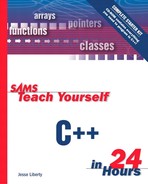Pointer, Pointer, Who Has the Pointer?
When your program allocates memory on the heap, a pointer is returned. It is imperative that you keep a pointer to that memory, because after the pointer is lost, the memory cannot be deleted and becomes a memory leak.
As you pass this block of memory between functions, one of the functions will “own” the pointer. Typically the value in the block will be passed using references, and the function that created the memory block is the one that deletes it. But this is a general rule, not an ironclad one.
It is dangerous for one function to create space in memory and another to free it, however. Ambiguity about which owns the pointer can lead to one of two problems: forgetting to delete a pointer or deleting it twice. Either one can cause serious problems in your program. It is safer to build your functions so that they delete the memory spaces they created.
If you write a function that needs to create a block of memory and then pass it back to the calling function, consider changing your interface. Have the calling function allocate the memory and then pass it into your function by reference. This moves all memory management out of your program and back to the function that is prepared to delete it.
| ||||||||||
